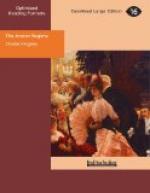The civilisation, not of mere book-learning, but of the heart; all that was once meant by “manners”—good breeding, high feeling, respect for self and respect for others—are just as common (as far as I have seen) among the hand-workers of England and Scotland, as among any other class; the only difference is, that these qualities develop more early in the richer classes, owing to that severe discipline of our public schools, which makes mere lads often fit to govern, because they have learnt to obey: while they develop later—generally not till middle age—in the classes who have not gone through in their youth that Spartan training, and who indeed (from a mistaken conception of liberty) would not endure it for a day. This and other social drawbacks which are but too patent, retard the manhood of the working classes. That it should be so, is a wrong. For if a citizen have one right above all others to demand anything of his country, it is that he should be educated; that whatever capabilities he may have in him, however small, should have their fair and full chance of development. But the cause of the wrong is not the existence of a caste, or a privileged class, or of anything save the plain fact, that some men will be always able to pay more for their children’s education than others; and that those children will, inevitably, win in the struggle of life.
Meanwhile, in this fact is to be found the most weighty, if not the only argument against manhood suffrage, which would admit many—but too many, alas!—who are still mere boys in mind. To a reasonable household suffrage it cannot apply. The man who (being almost certainly married, and having children) can afford to rent a 5 pound tenement in a town, or in the country either, has seen quite enough of life, and learnt quite enough of it, to form a very fair judgment of the man who offers to represent him in Parliament; because he has learnt, not merely something of his own interest, or that of his class, but—what is infinitely more important—the difference between the pretender and the honest man.
The causes of this state of society, which is peculiar to Britain, must be sought far back in the ages. It would seem that the distinction between “earl and churl” (the noble and the non-noble freeman) was crushed out in this island by the two Norman conquests—that of the Anglo-Saxon nobility by Sweyn and Canute; and that of the Anglo-Danish nobility by William and his Frenchmen. Those two terrible calamities, following each other in the short space of fifty years, seem to have welded together, by a community of suffering, all ranks and races, at least south of the Tweed; and when the English rose after the storm, they rose as one homogeneous people, never to be governed again by an originally alien race. The English nobility were, from the time of Magna Charta, rather an official nobility, than, as in most continental countries, a separate caste; and whatever caste tendencies had developed




